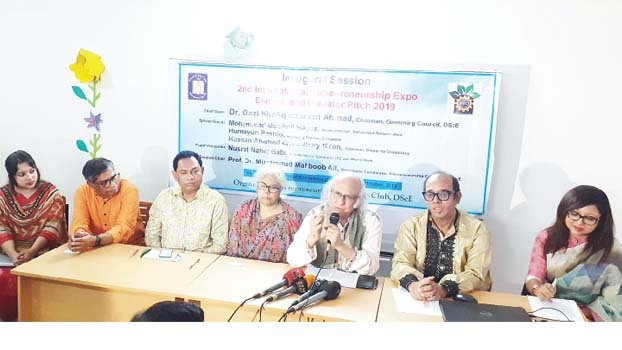Lack of technical skill, bureaucratic constraints obstruct entrepreneurship


Speakers at an international entrepreneurship summit on Friday blamed lack of technical skills, market or business knowledge, legal and bureaucratic constraints, political instability and non-cooperative attitude of banks and other institutes as major barriers on the way to expected development of entrepreneurship in the country.
Dhaka School of Economics organised the two day international event styled "2nd International Entrepreneurship Expo Summit and Elevator Pitch-2019" at the conference room of SWID Convention Center, Eskaton Garden in city.
Eminent economist Prof. Dr. Qazi Khaliquzzaman Ahmad attended the inaugural session as chief guest while Md. Manirul Haque, senior manager Solidaried Network Asia, was present as special guest with Prof. Dr. Muhammad Mahbub Ali in the chair.
In his speech, Dr. Q K Ahmad pointed out that lack of skill and ethical lessons in the education system resulted in the recent scandals in the financial sector.
Praising the ongoing anti-casino drive, Dr. Ahmad suggested conducting similar drives in other sectors, including the banking and financial sectors.
"The situation in the country's banking industry has deteriorated extremely in recent time. Disparity is widening day by day. Wealth is being possessed by a certain number of people so this disparity needs to be removed for sustainable development ", he added.
Nusrat Nahid Babi, a private sector specialist and Equitable Growth, Finance and Institutes (EFI) Advisory, World Bank Group presented keynote paper, in the inaugural session of the summit.
As facilitating factors for entrepreneurship, she recommended for technical knowledge, entrepreneurial training, market contacts, family business, availability of capital, successful role models, local manpower, government and institutional support and capabilities in the entrepreneurship eco-system.
Suggesting to build capability within government agencies, she stressed on identifying key factors driving skill gaps at the sector and value-chain level that constrain firm competitiveness in growing industries and identifying areas for the private sector to improve programs addressing ‘supply side’ skills issues like improving formal technical, vocational, and educational training systems, or strengthening teacher training.
She further stressed on assessing opportunities and constraints for firms seeking competitive skills, including understanding the dimensions of skills as a constraint to firm growth relative to other inputs, including investment climate issues, identifying sectors with growth potential that are constrained by a lack of available skills, mapping stakeholders from across various groups including employers, training providers (public and private), government, and civil society.
She dwelt on providing an enabling environment to match skills delivered by post-secondary training system with firm needs by linking employers with public and private education and training providers, strengthening the effectiveness of quality assurance and competency frameworks, removing regulatory bottlenecks which constrain private sector investment in education and training, creating labor market information systems to enhance access to information and supporting private investment in post-secondary training to enhance options for quality and relevant education and training,
Managing Director of Energypac Humayun Rashid and Chairman of 'Dibate for Democracy' Hasan Ahmed Chowdhury Kiron also spoke on the occasion.
Representatives of 18 local and international universities from India, Thailand and Australia are participating in the summit.
The speakers suggested to assess the opportunities and constraints of current performance and needs of entrepreneurs and small and medium enterprises (SMEs), business environment, including access to key inputs such as capital, labor, infrastructure, and technology, access to national, regional, and international markets, including global value chains, to growth by entrepreneurship.


